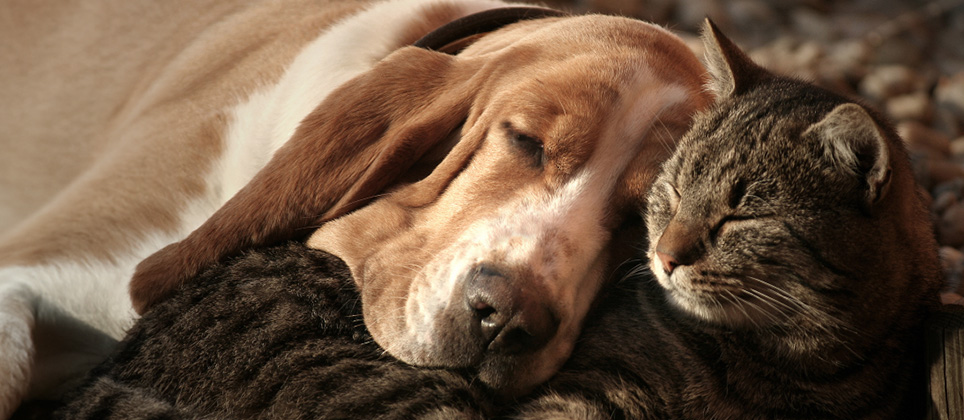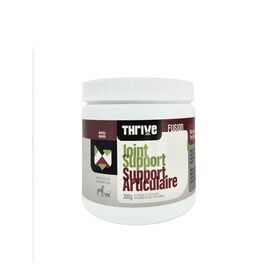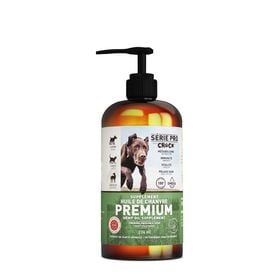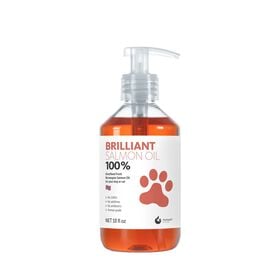Aging affects everyone, even your pet! Indeed, getting older can greatly influence your dog's or cat's behaviour and state of health. So it's up to you to take care of your senior pet and to make sure they have everything they need to age well.
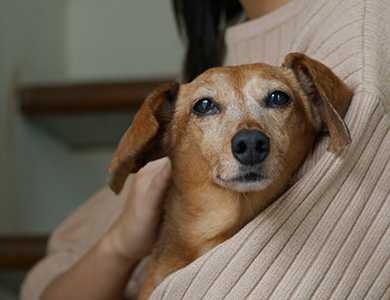
At what age is a pet senior?
On average, animals enter their senior years around the age of 7, even if they don't show any visible signs of ageing yet.
Dog life expectancy
A dog's life expectancy varies according to their size (small, medium or large), but also according to their breed and lifestyle. Large dogs live shorter lives than small dogs. They have a life expectancy of around 8 to 12 years, while small-breed dogs live between 12 and 16 years.
Cat life expectancy
The average life expectancy of a domestic cat is around 15 years. Furthermore, it's not unusual for some cats to live longer when properly cared for. Obviously, breed, lifestyle and diet are all factors that can impact life expectancy.
Prevalent health problems in older cats and dogs
After your cat or dog reaches the age of 7, you'll gradually notice changes in their physical appearance. As with humans whose hair turns white, your pet's coat may turn gray. Their behavior may also change over the years: they may become less patient, less energetic, and may seem a little more confused.
While these are changes that come with old age, they can also be signs of illness. Here are 6 common health problems in older pets that require your vigilance.
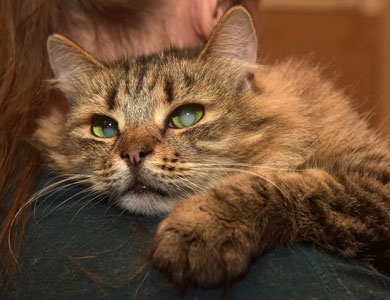
Vision and hearing problems
Does your companion seem to be having trouble seeing clearly, is stumbling more often and has eyes that seem to be covered with a bluish haze? They may have a condition called nuclear sclerosis, which affects the transparent lens in their eyes. This lens, also known as the crystalline lens, becomes more opaque, but still lets light through. This is a perfectly normal condition that occurs as pets age.
Cataracts are less common. In this case, the eye becomes whitish and the crystalline lens no longer lets any light through. This is a condition that can be treated by surgery, as in humans. However, it's important to know that cataracts can be related to diabetes.
It's also common for animals to lose their hearing as they age. This is a normal change that requires you to modify your habits and be more careful, especially when going outdoors.
Also read : Obesity in pets: health consequences and solutions
Weight issues
Be aware of fluctuations in your pet's weight. Make sure you keep your dog or cat away from weight problems by choosing a food that's right for its age stage and lifestyle.
Although it may be normal to see a slight to moderate weight gain with the decline in physical activity linked to ageing, it may also be due to a health problem, such as a thyroid disorder for example.
Weight loss, especially if it is quite sudden, is more worrying and requires a prompt examination by your vet.
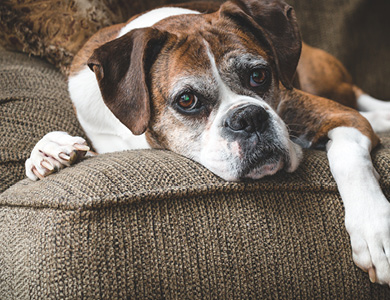
Cognitive changes
Old age doesn't spare your dog or cat's brain. Cognitive dysfunction can lead to behavioral changes and anxiety in older pets. If you find that your companion is disoriented, has a disrupted sleep cycle, has hygiene problems or "accidents", and doesn't seem to be themselves in their interactions with people and other animals, consult your vet.
To help support your pet's brain development, you can give various supplements, such as coconut oil, products containing omega-3 and hemp oil, as a preventive measure. Feel free to talk to one of our in-store specialist about it.
Dental issues
Does your pet have bad breath? Are their gums red? Dental problems are very common in older pets. A veterinary check-up is essential to make sure your pet doesn't need extensive dental care, sometimes including extracting painful teeth.
Once again, prevention plays an essential role, and there are many in-store products that can help keep taking care of your pet's dental health.
Also read : Your pet's dental hygiene: everything you need to know
Urinary problems
Older pets sometimes have more difficulty controlling their bladder and may become incontinent. Make sure, however, that it's not a symptom of a health problem. If your pet is drinking or urinating more, it's a sign that it's time to contact your vet. If water consumption remains normal, you'll simply have to be vigilant and take your dog out more frequently.
An aging cat peeing outside the litter box also points to a problem. Osteoarthritis affects 80% of cats over the age of 12, but you may find it hard to notice, as they're very good at hiding their discomfort. The litter box in the basement can then be hard to get to without pain, and the litter box with a high rim, difficult to step over. However, before blaming it on the discomfort of osteoarthritis, a urinalysis is necessary to rule out the possibility of an urinary problem.
Also read : My cat is peeing all over the house! What can I do?
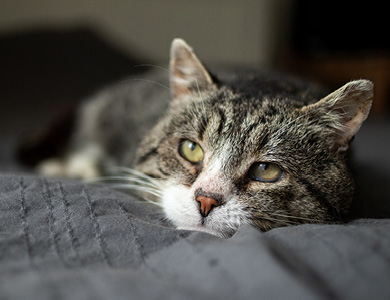
Arthritis
As mentioned above, joint pain affects animals as well as humans. You can help ease the pain associated with arthritis in a number of ways :
- Make sure your pet does low impact exercise on a regular basis.
- Maintain them at a healthy weight.
- Give them supplements.
- Adapt their environment by installing ramps or moving the litter tray.
In some cases, medication may be prescribed. Physiotherapy, acupuncture and osteopathy can also be beneficial.
The list of health problems that can affect older pets goes on and on, from hypertension and diabetes to more severe conditions such as cancer. That's why more regular visits to your vet, a high-quality diet and a healthy lifestyle are essential to make sure your pet stays by your side for as long as possible!
This article was reviewed by Dr. Valérie Trudel, veterinarian and member of CABEA Mondou.
